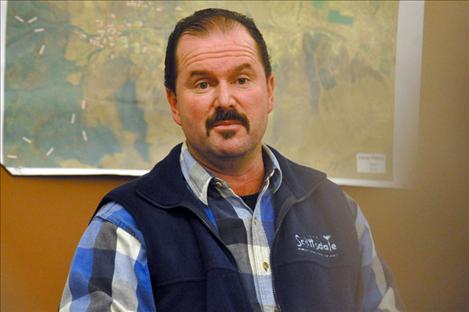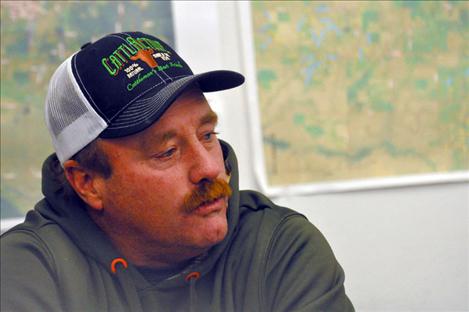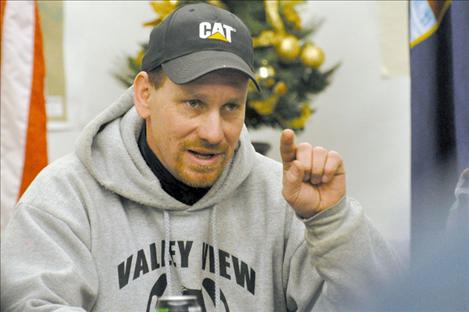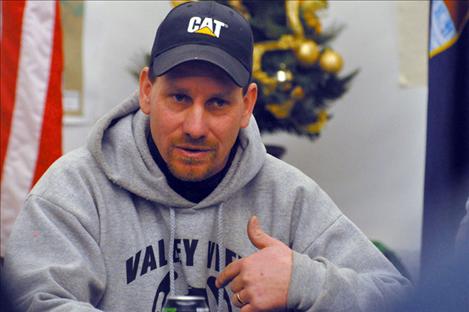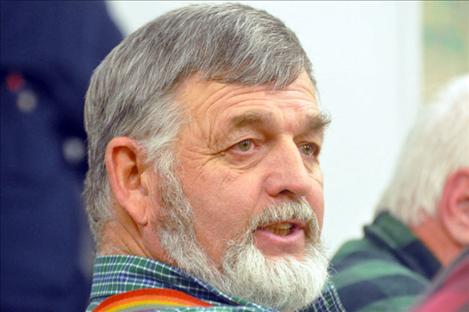Irrigator board against water compact
Hey savvy news reader! Thanks for choosing local.
You are now reading
2 of 3 free articles.
ST. IGNATIUS – In an 8-2 vote the Flathead Joint Board of Control approved a resolution Dec. 30 that voices non-support for the Confederated Salish and Kootenai Water Compact, set to go before the ongoing legislative session.
The board also refused to entertain a motion by one commissioner who wanted to put the issue to a popular vote by the irrigators.
“I feel we need to give irrigators the opportunity to tell us if this is the trail we want to take and see if we actually know what irrigators want,” Guenzler said. “Do they want to go (with the resolution) or with the compact? It is an opportunity to let them tell us what they want.”
But commissioners disagreed, and Guenzler’s suggestion died without a motion.
“It has been two election cycles, we’ve had a referendum last year, all based on our position and our three issues,” Commissioner Jerry Laskody said. “In every case the opponents have increased their position on the board, indicating that the irrigators are opposed to this compact. Nothing has changed. We have another election cycle this spring, and there’s an opportunity for the opposition to change the makeup of this board.”
Commissioners voted to adopt the resolution in opposition to the compact that would settle water claims for the Confederated Salish and Kootenai Tribes. The resolution says a majority of the board believes the agreement will give irrigators less water than has been delivered historically, not provide adequate water title to irrigators, and create an unconstitutional water management board consisting of equal tribal and non-tribal representation that will govern some aspects of future water use within reservation boundaries.
The board also complained in the resolution that the irrigators were left out of the renegotiation of the compact after it initially failed to pass the legislature in 2013. The State of Montana spent much of the past year negotiating for a water delivery right for members of the Flathead Indian Irrigation Project and adaptive management plan that provides for a course of action if the water delivery to farms is not equal to historic use. State representatives negotiated the deal because in early 2013, when the process was restarting, the Flathead Joint Board of Control had dissolved in a bout of political infighting and legally wasn’t allowed to be a part of the process.
The board reformed in summer 2014, and eventually managed to arrange a meeting with state officials in November after releasing a position statement on the water compact listing three main concerns that are almost identical to the items listed in the resolution passed last week. Commissioners called the meeting with state officials a dead end where they weren’t heard.
“They have refused to talk,” Commissioner Tim Orr said.
Representatives for the state countered by saying that commissioner’s demands weren’t reasonable.
The renegotiation continued to completion until Dec. 10 without official input from commissioners. The resolution paints a clear picture of which direction the board plans to direct lobbyist Abigail St. Lawrence, who was hired in December for $15,000 per month to work half-time on letting legislators know the board’s position on the compact.
The 2015 legislative session is the last chance to get state approval for the compact, before the June 30 deadline for filing claims in the state’s water court kicks in. If there is no compact, tribal officials have said they will file as many as 10,000 claims in the water court, as far east as Billings. The tribes have limited their claims to west of the continental divide and would share most off-reservation claims with state agencies under the compact.
If the compact passes, it must also be approved by the United States Congress. Other water compacts have withered in recent congressional sessions without action or allocated funding, which makes it impossible to say when the agreement would actually go into effect if passed.
Before it goes to the legislature the Montana Reserved Water Rights Compact Commission must approve the document. The commission has negotiated 16 water compacts with tribes, wildlife refuges, and other federal entities that have federally reserved water rights. The Confederated Salish and Kootenai Compact is the state’s last pending compact. The commission is holding two meetings this week to give the public one last chance to comment on the document before a vote in Helena Jan. 12 at the Great Northern Hotel. That meeting begins at 7 p.m.
An additional meeting will be held at the Ronan Performing Arts Center in Ronan on Jan. 9. The first portion of the public meeting, for on-reservation irrigators, will begin at 4 p.m. The public meeting for comment on the revised compact is set for 7 p.m. Another meeting for comment on the compact is set for Jan. 10 at the Hilton Garden Inn in Kalispell at 7 p.m.
For all the listening sessions being held and the board’s resolution, some irrigators in the room were doubtful about how effective input into the controversial issue will actually be.
“This will basically wind up in the United States Supreme Court,” said Bill Slack, former irrigation commissioner and consultant to the joint board. “It’s just a matter of whether the state is on your side.”
But others want to avoid what could be a years-long costly court battle.
“I do not support this board hiring a lobbyist and levying more money on us,” irrigator Dave Stipe said.
Board chairman Boone Cole said adjudication of the irrigator’s water rights claims is the board’s ultimate goal at the moment.
“We’ve heard people say’ I don’t care if I have a water right, as long as someone agrees to give me water,’” Cole said. “But you are trading a right for a contract and no one has seen a contract that can’t be changed.”
Cole said no one knows how much carrying the issue to court will cost.
“We’ve had some people speculate a lot on how courts are going to rule, how courts are going to decide, but quite frankly nobody knows,” Cole said.
Cole compared the board’s situation to the parable in the Bible where leaders have to weigh the cost of war. He said the board has tried to keep peace for two years.
“We’ve done everything we could to get people to listen to us, even without their attention,” Cole said. “We’ve tried to acquire terms of an agreement, but how far are we going to be pushed? How much are we going to give? One of the things that quite surprises me from these meetings is that everyone is ready to give up. Is there nothing you’ll fight for?”
















